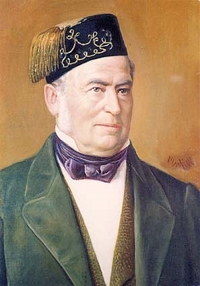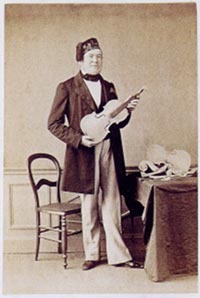JEAN BAPTISTE VUILLAUME
I tried to find an adjective able to describe in a word, the peculiarities of Jean-Baptiste Vuillaume's character: wise, scrupulous, machiavellian . But it all seems not to complete the picture of this man. So to find out more, you are compelled to read the whole article!

Although if he was a bowmaker, J.B. Vuillaume, thanks to his business skils , the constant research, and in-born instinct for the great craftsmen, has made the development of the greatest tradition in French bowmaking possible .
As mentioned many times, there was not a school as we conceive it today . You began in Mirecourt as a child and if you had some talent, after years of apprenticeship, you moved to Paris at King Vuillaume's court to refine the craft. One case stands out: Dominique Peccatte.
History
Jean-Baptiste was born in Mirecourt on 16 Vendémiaire of the year VII accordingly to the Revolution calendar; October 7, 1798 in the Gregorian Calendar, by Claude Francois, a professional bowmaker and Anne Leclerc.
First of five brothers who will reach adulthood, even if seven were born from the marriage , J.B. began his apprenticeship at the age of twelve, but given the difficulty of maintaining such a large family, the father decided to send him to another workshop , in order to have one more salary entering home.
He worked probably in more than one workshop. From that one of Joseph Chanot, craftsman close to his father, to Nicolas Mathieu who had his custody after his mother's death , until arriving to Simoutre, who will give him a valuable opportunity to move to Paris.
Simoutre's son, Nicholas Eugene, almost a contemporary of Vuillaume, was invited to work in Paris by Francois Chanot, who made violins and guitars, but due to family circumstances he had to decline the invitation, and instead suggested J.B. in his place.
After having obtained a passport, as Mirecourt belonged to Lorraine in those times, on September 17, 1818 Vuillame left for Paris where he will work by Chanot for some years.
After having fulfilled his military service he is hired by Lété , merchant and manufacturer of organs, who in 1823 received a silver medal at the Paris Exhibition for a violin made by J.B., and thanks to this reason he is allowed to begin signing his own instruments.
While working in the capital and having a well-functioning brain, he soon realized the importance of technical and mechanical innovations introduced by Tourte in the making of bows, both in terms of sound and playability. Unfortunately for him the Great Maestro , was already well known even outside the country boundaries and he was already well ahead with age.
In 1825, however, he meets a worthy replacement for Tourte, of whom we have already spoken deeply on the blog: Jean Pierre Marie Persoit.
Persoit is already a renowned craftsman, but as I already said, he is humbler and more modest than the impetuous Tourte, and although he already owns his own style and is fifteen years younger, Vuillaume slowly manages to impose him his stylistic models.Always in 1825 he entered into partnership with Leté, but the idyll will not last long, stopping in '27.
In 1826 he has one of the most important meetings in the history of French bowmaking: Dominique Peccatte, he arrives in Paris when he is only sixteen and Vuillaume send him to Persoit who will become his teacher. From this moment on, the workshop of J.B.V. will become the focal point for the training of youngs promises of French bowmaking.
In addition to Persoit and Dominique Peccatte by Vuillaume the following people worked:
Claude Joseph Fonclause from 1830 to 1840
Nicolas Maline from 1840
Jean Gran Adam from 1842 to 1853
Joseph Henry from 1847
Pierre Simon from 1847
Francois Peccatte from 1852 to 1853
Nicolas Meire probabably about 1860
Francois Nicolas Voirin (his nephew) from 1855
Charles Peccatte followed by Voirin from 1866 to 1870
Jean Josep Martin from 1858 to 1863
Charles Claude Husson from 1870 to 1874
Justin Poirson around 1870
Prosper Colas from 1873 to 1874
There were also some foreign workers :
L. Bausch 1840
E. Liebich 1850
J-C Nurnberger 1860
T. Jacobsen 1874
H-R Pfretschner 1874

Jean Baptiste Vuillaume dies in Paris on March 19, 1875 due to a stroke from which he was struck two days earlier, leaving some of the greatest bows ever built and especially he revolutioned the very way of understanding violin making.
As one of the key characters of French abowmaking, thed articles on him will be more than one. Next week we will discuss the technical innovations he introduced.
So long.
Paolo.
|